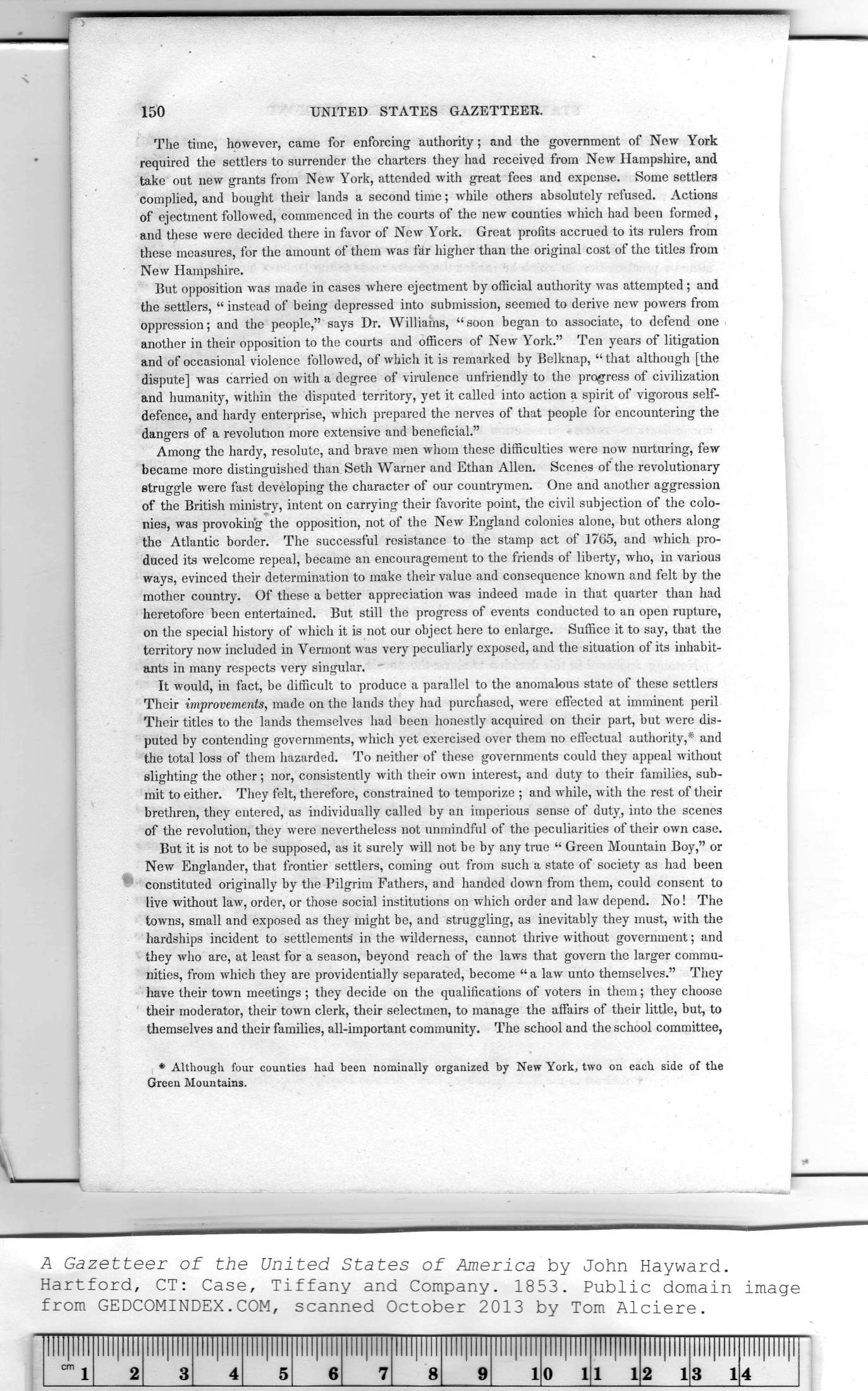|
|
Note: Ctrl and + increases the font size of the text below, Ctrl and - decreases it, and Ctrl and 0 resets it to default size.
150 UNITED STATES GAZETTEER.
The time, however, came for enforcing authority; and the government of New York
required the settlers to surrender the charters they had received from New Hampshire, and
take out new grants from New York, attended with great fees and expense. Some settlers
complied, and bought their lands a second time; while others absolutely refused. Actions
of ejectment followed, commenced in the courts of the new counties which had been formed,
and these were decided there in favor of New York. Great profits accrued to its rulers from
these measures, for the amount of them was far higher than the original cost of the titles from
New Hampshire.
But opposition was made in cases where ejectment by official authority was attempted; and
the settlers, “ instead of being depressed into submission, seemed to derive new powers from
oppression; and the people," says Dr. Williams, “soon began to associate, to defend one
another in their opposition to the courts and officers of New York." Ten years of litigation
and of occasional violence followed, of which it is remarked by Belknap, “ that although [the
dispute] was carried on with a degree of virulence unfriendly to the progress of civilization
and humanity, within the disputed territory, yet it called into action a spirit of vigorous self-
defence, and hardy enterprise, which prepared the nerves of that people for encountering the
dangers of a revolution more extensive and beneficial."
Among the hardy, resolute, and brave men whom these difficulties were now nurturing, few
became more distinguished than Seth Warner and Ethan Allen. Scenes of the revolutionary
struggle were fast developing the character of our countrymen. One and another aggression
of the British ministry, intent on carrying their favorite point, the civil subjection of the colo-
nies, was provoking the opposition, not of the New England colonies alone, but others along
the Atlantic border. The successful resistance to the stamp act of 1765, and which pro-
duced its welcome repeal, became an encouragement to the friends of liberty, who, in various
ways, evinced their determination to make their value and consequence known and felt by the
mother country. Of these a better appreciation was indeed made in that quarter than had
heretofore been entertained. But still the progress of events conducted to an open rupture,
on the special history of which it is not our object here to enlarge. Suffice it to say, that the
territory now included in Vermont was very peculiarly exposed, and the situation of its inhabit-
ants in many respects very singular.
It would, in fact, be difficult to produce a parallel to the anomalous state of these settlers
Their improvements, made on the lands they had purchased, were effected at imminent peril
Their titles to the lands themselves had been honestly acquired on their part, but were dis-
puted by contending governments, which yet exercised over them no effectual authority,* and
the total loss of them hazarded. To neither of these governments could they appeal without
slighting the other ; nor, consistently with their own interest, and duty to their families, sub-
mit to either. They felt, therefore, constrained to temporize ; and while, with the rest of their
brethren, they entered, as individually called by an imperious sense of duty, into the scenes
of the revolution, they were nevertheless not unmindful of the peculiarities of their own case.
But it is not to be supposed, as it surely will not be by any true “ Green Mountain Boy," or
New Englander, that frontier settlers, coming out from such a state of society as had been
constituted originally by the Pilgrim Fathers, and handed down from them, could consent to
live without law, order, or those social institutions on which order and law depend. No! The
towns, small and exposed as they might be, and struggling, as inevitably they must, with the
hardships incident to settlements' in the wilderness, cannot thrive without government; and
they who are, at least for a season, beyond reach of the laws that govern the larger commu-
nities, from which they are providentially separated, become “ a law unto themselves." They
have their town meetings ; they decide on the qualifications of voters in them; they choose
their moderator, their town clerk, their selectmen, to manage the affairs of their little, but, to
themselves and their families, all-important community. The school and the school committee,
* Although four counties had been nominally organized by New York, two on each side of the
Green Mountains.
|
Illllllll |
Illllllll |
Illllllll |
Illllllll |
Illllllll |
Illllllll |
llll|llll |
IHi|llll|l^l |
Illllllll |
llll|llll |
Illllllll |
Illllllll |
Illllllll |
|
|
cm j |
2 |
3 |
4 |
5 |
6 |
7 |
8 9 |
1 |
0 1 |
1 1 |
2 1 |
3 1 |
4 |
|
